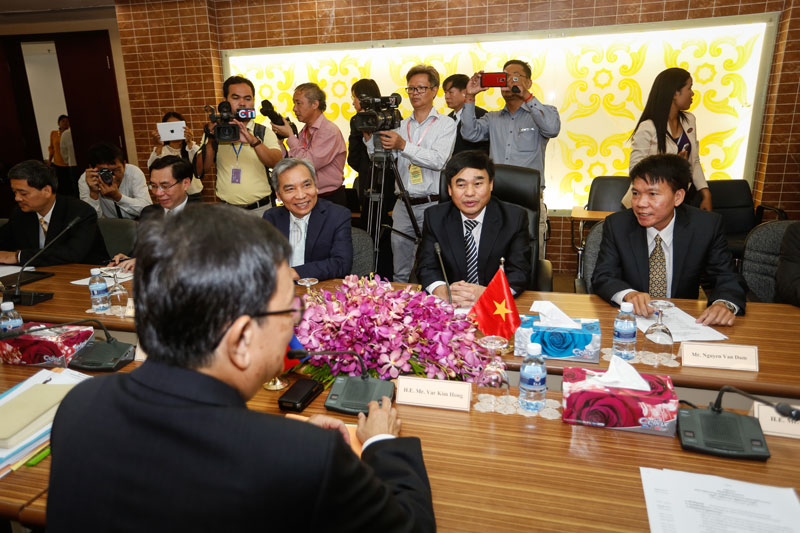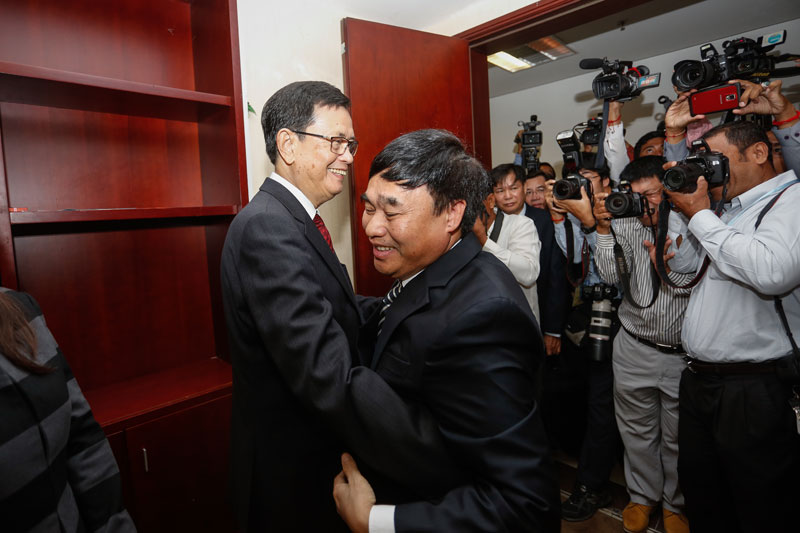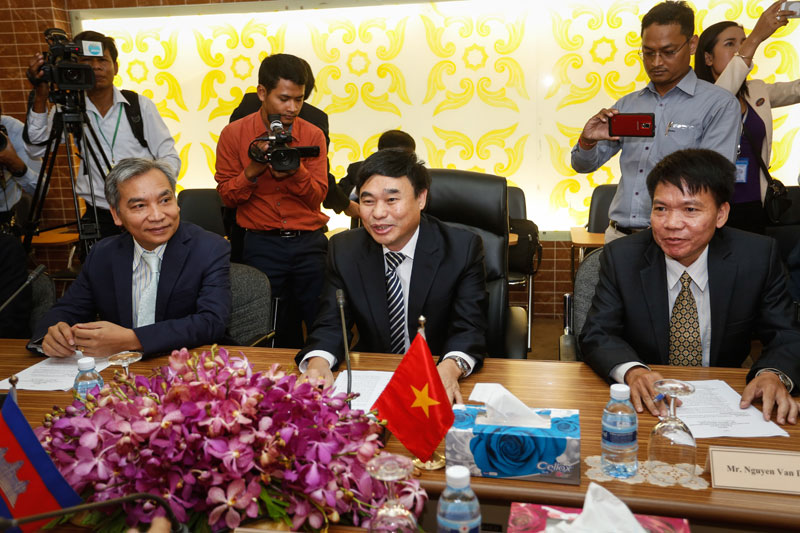Var Kimhong, the CPP government’s minister in charge of border affairs, declined to speak with reporters Tuesday after hosting Vietnam’s deputy foreign minister for the first Joint Border Committee meeting since the opposition CNRP began a campaign to uncover Vietnamese territorial encroachments.
Walking away from the morning meeting at the Council of Ministers building in Phnom Penh, Mr. Kimhong, whom the CNRP has accused of bowing to Vietnam’s interests during previous border talks, ignored reporters until one asked: “Your excellency, what did Vietnam decide?”

A visibly irritated Mr. Kimhong, who was waiting for an elevator, turned to the reporter and condemned the question.
“[We] were in the meeting together, why do you say ‘What did Vietnam decide?’” Mr. Kimhong said.
“[You] speak wrongly. Cambodia and Vietnam meet together, and decide together. Asking such a question is like we are their slave,” he said, declining to answer further questions.
The closed-door meeting at the Council of Ministers building was chaired by Mr. Kimhong and Ho Xuan Son, Vietnam’s deputy foreign minister, who are charged with negotiating the demarcation of the Cambodia-Vietnam border.
Mr. Kimhong could not be reached by telephone Tuesday. However, Kuy Pisey, his deputy, said Tuesday the two-day meeting would address undemarcated border areas, as well as recent incidents.
“There are two important agendas to address at the meeting. Firstly, we will continue to settle the remaining issues on which we have not yet agreed together,” Ms. Pisey said.
“Secondly, it will be about a number of incidents along the border,” she added. “The incidents we will raise are, for example, the incidents of digging ponds and building roads and [military] posts along the border, and some areas that are very close to the border.”
Led by lawmakers Um Sam An and Real Camerin, the CNRP has since last month highlighted a number of alleged territorial encroachments by Vietnam, including large ponds being dug in a “white zone” on the Ratanakkiri provincial border and a military post being built in another such area along Kandal province.

The “white zones” are disputed areas of the border that have been earmarked for future talks between officials on the Joint Border Committee, and which neither country is allowed to develop or otherwise stake claims to in the meantime.
Mr. Camerin also claims to have been beaten with wooden poles by Vietnamese civilians while leading activists on June 28 to a disputed area of Svay Rieng province’s border, where Vietnam has been building a road.
Cambodia’s Foreign Affairs Ministry followed each of the visits by the opposition lawmakers and activists with stern diplomatic missives to the Vietnamese government, demanding that they cease such building in accordance with “white zone” rules.
Ou Virak, a political analyst and founder of the Future Forum think tank, said the CPP’s reflexive secrecy about its border demarcation work with Vietnam—typified by its continued refusal to publicly release official border maps—is helping the CNRP execute its campaign against the government.
“In some ways, the opposition is now winning the public relations battle, but it doesn’t take much to do that. The CPP finds it very difficult to shake the legacy of being the puppet of Vietnam, so it’s very easy for anyone to exploit,” Mr. Virak said.
“The problem is that the CPP is behaving like they have a lot of things to hide, and that’s fueling speculation among the Cambodian people.”
Prime Minister Hun Sen’s government has struggled to dampen CNRP claims that it is refusing to release its official maps of the Vietnamese border because they are in fact illicit ones drawn during Vietnam’s 1980s occupation of Cambodia.
On Monday, Mr. Hun Sen wrote a letter to U.N. Secretary-General Ban Ki-moon asking to borrow the legal French-drawn maps stored at the U.N. to compare them with those the government has used to demarcate the border.
Farhan Haq, Mr. Ban’s deputy spokesman, said in an email Tuesday the secretary-general was considering the request. “Yes, he has received the letter. We are studying it for now and may have more information later,” Mr. Haq said.




